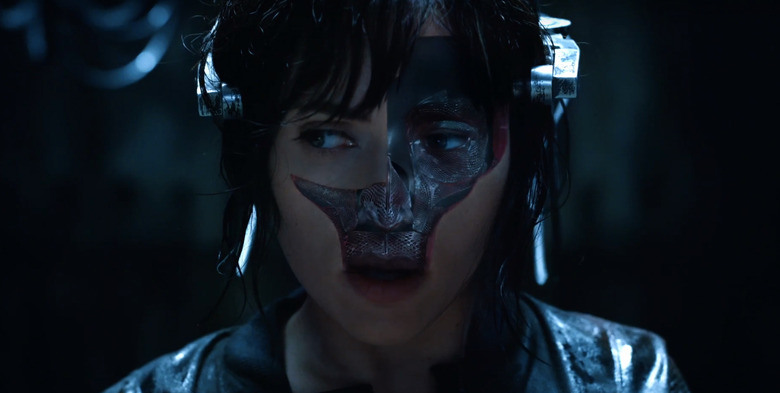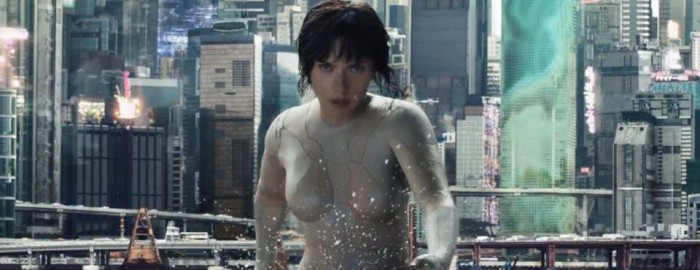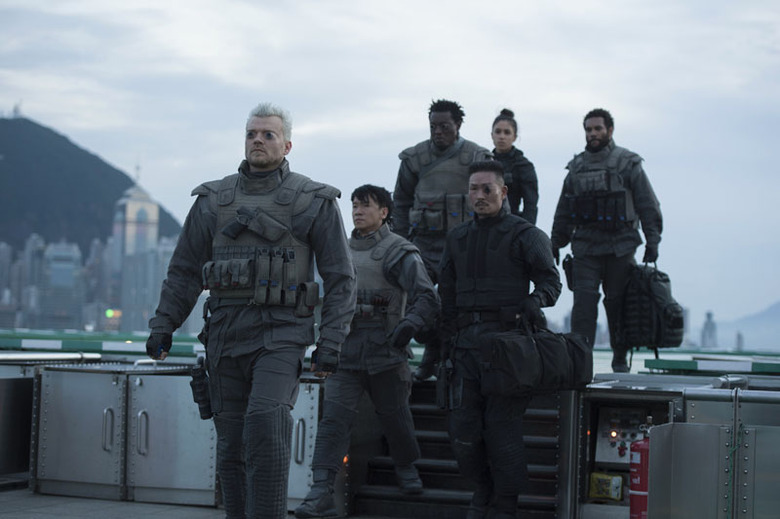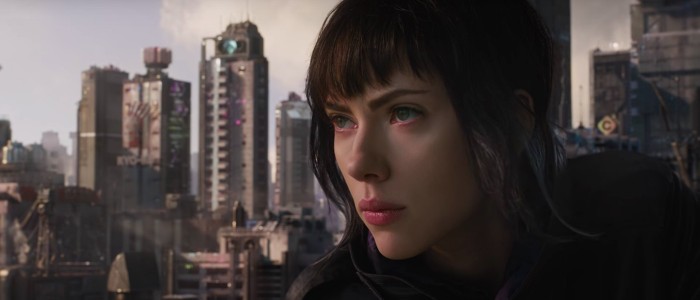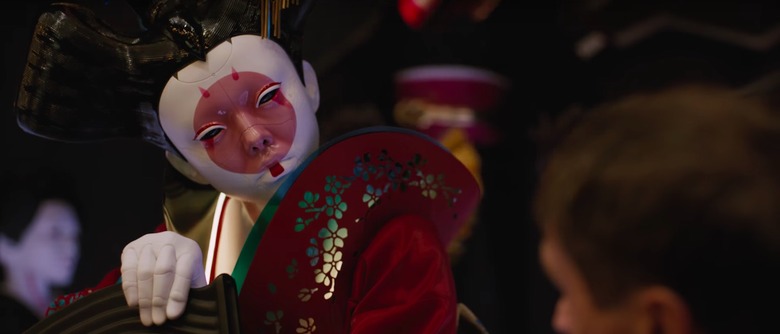'Ghost In The Shell' Spoiler Review: A Cold, Distant, And Familiar Future
(In our Spoiler Reviews, we take a deep dive into a new release and get to the heart of what makes it tick...and every story point is up for discussion. In this entry: Rupert Sanders' Ghost in the Shell.)Ghost in the Shell sometimes feels more preoccupied with how characters are framed than what they're doing and saying. They usually look and sound fantastic, but rarely do they register as real flesh and blood in director Rupert Sanders' adaptation of the classic manga and anime. Ghost in the Shell is a distancing movie never quite as humane as its themes.
Below, check out our Ghost in the Shell spoiler review.
In the Future...
While technology is busy invading our lives in the present, 32 years from now, it'll be invading our bodies. Or at least that's the premise here. Set in Japan in 2049, Major Killian (Scarlett Johansson) leads a task force for Section 9. Major, whose human mind occupies a cyborg body, was "saved" and created by Hanka Robotics and Dr. Ouelet (Juliette Binoche) after her human body was left destroyed in an attack.
Major's new mission has her tracking down Kuze (Michael Pitt), a cyber threat murdering Hanka Robotics' employees. While her Section 9 team stands behind her, including two the film's highlights, Batou (Pilou Asbæk) and Chief Daisuke Aramaki ("Beat" Takeshi Kitano), the outsider spends much of her time isolated and searching for the truth behind the killings and her past.
Ghost in the Shell is appropriately bleak. Major's story is pretty horrific, at least on paper, so there's not a whole lot of need or room for laughs. Sanders and screenwriters Jamie Moss, William Wheeler, and Ehren Kruger commit to a serious tone. They don't bring much levity to Masamune Shirow's story. The melancholic atmosphere sometimes rings as false, though.
A Lack of Emotion
Major's internal struggles are mostly surface-level drama in Ghost in the Shell, which doesn't have enough drama, excitement or suspense to make some marvelously crafted environments live and breathe. The character's sense of isolation, being the only one of her kind, is something Ouelet tells her – they're not emotions Sanders makes tangible.
Like Hanka Robotics, the film isn't too interested in Major's emotions and her relationship with Dr. Ouelet is an example of that. Dr. Ouelet's past experiments and what she did to Major lands with a thud. When the doctor tries to explain herself, it's a noticeably well blocked and shot scene, not another emotional turn in Major's journey. Instead of a sense of betrayal or heartbreak, it's just a scene with a few exceptional compositions. It's as emotionless as when the Major breaks through a window at the start of the film's first set piece – an arresting shot and the start of a gracefully shot action scene.
Shoddy Mechanics
Binoche tries to show that the doctor is protective of Major, that she does care in some warped way, but she sometimes has to deliver too much exposition for their scenes to go beyond servicing the plot. Binoche, a great actress, has to help push a mostly predictable story forward. When Binoche and Johansson share some underwhelming scenes, the film's untapped potential is apparent.
The whole third act is also set in motion partially because of a silly decision involving Dr. Ouelet. Of all the people asked to terminate Major, Cutter (Peter Ferdinando), the big bad at Hanka Robotics, thinks the doctor is the right person to do it. He asks the one character with motivation to help the cyborg agent escape to pull the plug! It's not a terribly bad cheat or a major problem, but the movie creates enough distance for the mind to wander and question the mechanics of it all.
Johansson, one of today's most talanted actors, not just movie stars, has a striking presence as Major. She walks in a hunched, distinctly inhuman way that contrasts some flickers of humanity. The character's body and mind are at complete odds. Major is never comfortable in her skin. It's an idea Johansson effectively communicates, but it's another good idea that doesn't make the film any less dispassionate overall.
Half-Baked Ideas
When Major wants to touch a woman's face, it should probably be intimate, maybe even beautiful and sad, but it doesn't leave any lasting impact. There's no question Johansson is always present in the film. She's just not always supported by the script, which despite a reserved pace, doesn't have many patient, purely character-driven scenes.
Some intriguing ideas come and go fast. In one scene, Batou very briefly philosophizes about reality and fantasy. These days, he wonders, what's the difference? As he looks around the room with his enhanced new eyes, seeing other upgraded humans, Major, and a man controlled by Kuze, it's a good point, but it's almost redundant because it's not an idea the film interested in exploring.
Asbæk could've kept going on and on, though, because he has, like Johansson, a strikingly unusual presence when he enters any one of the memorable sets designed by Jan Roelfs. When Batou stands next to Major, it's almost like watching the 1995 anime, with the two of them appearing almost unreal, which, perhaps, relates to Batou's thoughts on reality and fantasy blurring.
A Few Things Do Work
Asbæk does participate in the film's standout scene, too. The Major and Batou infiltrate a Yakuza club, where they quickly find trouble. It's a creepy, smokey set reminiscent of Blade Runner and Black Rain. Sanders does create some real suspense in this action scene. The sweaty criminal torturing Major is such an unpleasant and unexpected turn in the movie, and it's one scene that does elicit some reaction.
When Major and her partner are on the job, Ghost in the Shell actually plays a bit better as a buddy cop movie than a reflective sci-fi film. The puppet master they're chasing is less compelling to watch, although he is played creepily by Pitt. The actor brings anger and sadness to Kuze, but because of a few glaring similarities, the character does fall a little bit under Blade Runner villain Roy Batty's shadow. As eye-catching as Pitt's character's presence is, when the character is about to be destroyed by the spider, it is another surprisingly distant scene where the scenario is more routine than personal.
Wrapping Up
Johansson's casting has been understandably criticized for whitewashing, which is an issue the movie shines a bright spotlight on in the third act. Ghost in the Shell does have a multicultural cast and world, but it is a bit questionable to keep a story's famous plot points and sequences, mood, and setting (Japan), but to decide immediately from the start not to cast an Asian woman as the lead in a movie based on an inherently Asian property. The third act twist regarding Major's identity only makes the decision more questionable, and the extratextuality does shatter the world Sanders is trying to create.
The world of Ghost in the Shell is big and features some beautiful and oddball touches, but it isn't ever absorbing or palpable. Its familiarity to sci-fi classics and recent remakes of Paul Verhoeven classics isn't the problem, either. These environments aren't exactly lived-in. Fleshed out characters aren't always the film's focus, so this futuristic Japan is sometimes as unbelievable as some of its characters. The contrast of grimy and wet streets and cars and tech of the past and Hanka's cold offices (and the majority of the film's visuals) are frequently pleasing to the eye, but infrequently meaningful and entertaining.

